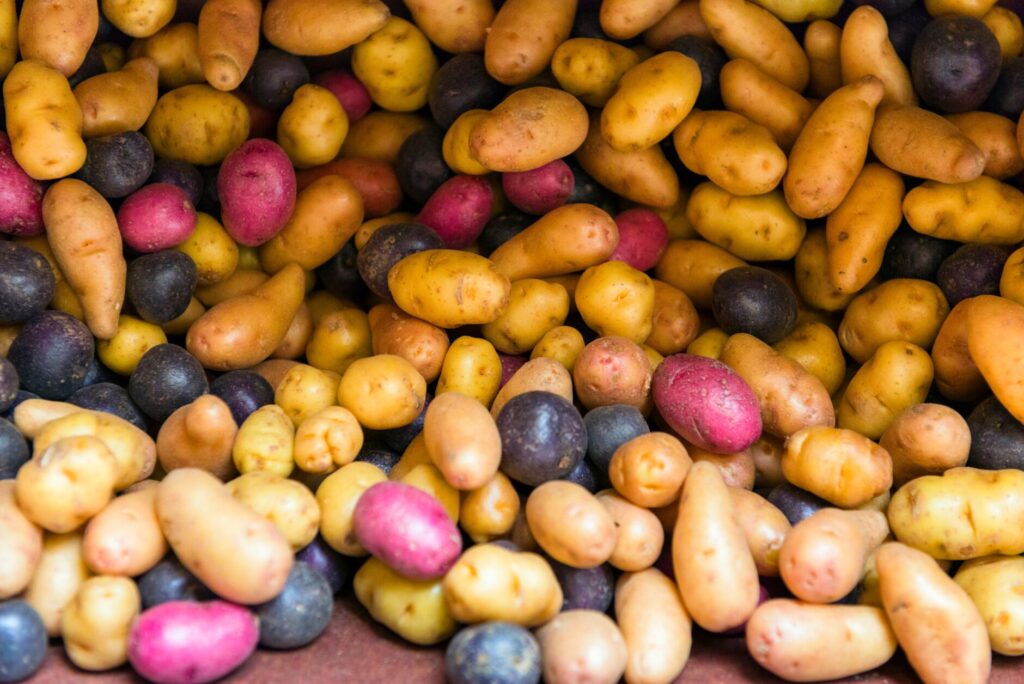
Israeli startup ReaGenics has developed a cell-based potato with 31% protein content, which could rise even higher.
ReaGenics, an Israeli biotech startup leveraging cellular tissue culturing to grow plant molecules in bioreactors, has created high-protein potatoes that have significant advantages over soy or pea.
While potatoes typically contain just 2% of native protein and aren’t what comes to mind when you think of a protein crop, ReaGenics has used cellular agriculture to develop spuds with 31% protein content. This could potentially rise to 40% and open up new markets for the company.
“Not all potato varieties can be made into tissue culture,” co-founder and chairman Michael Kagan told AgFunderNews. “But we managed to do it with a select few, and when we optimised conditions for the cells to grow, we discovered that the concentration of the proteins in the cells is far higher.”
He added: “And then by applying different stress conditions (temperature, media etc) you can get it even higher, and this is all non-GMO, with the full spectrum of amino acids that you would find in a [regular] potato.”

A functionally efficient, high-protein spud
While it has been around for decades, plant cell culture is still a burgeoning segment of the smart protein space, and is among a number of technologies “key to tackling the problem of recreating dairy proteins and other ingredients on a mass scale”, according to Albrecht Wolfmeyer, director of ProVeg Incubator.
These startups don’t use regular agricultural inputs like water or soil, instead growing plant cells in bioreactors, which are fed sugar, vitamins, minerals, etc. It allows companies to eschew the huge amount of resources needed to grow plants, and ensure a consistent supply resilient to climate change and other industry issues.
Kagan said cell-based potatoes enable a significant increase in protein production. “At the moment, the main market is for animal feed, although the protein is very close to animal proteins such as egg and casein when it comes to nutrition and functionality,” he explained.
“It is highly soluble and has gelling, foaming, emulsification, binding, texturising and stabilising properties, plus it is non-allergenic, which makes it very attractive to food formulators if the availability is there and the price is right. It has a PDCAAS [protein digestibility] score of 0.99,” he said. The maximum score on the PDCAAS spectrum is 1.0.
Kagan added: “It is also white-coloured with no unpleasant smell or aftertaste you need to cover up, which is not the case with most plant proteins, plus it has a very small environmental footprint.”
Meat and potatoes (sort of)

ReaGenics is among several startups revolutionising the potato protein market, which is set to grow annually by 7%. Avebe, Tereos, Roquette and Branston are all working in this space. Fellow Israeli company PoLoPo, meanwhile, is using molecular farming to increase the native protein content in potatoes (much like ReaGenics), as well as produce the main protein found in chicken eggs. South Korea’s E Green Global is similarly producing egg proteins in potatoes via plant cell culture.
ReaGenics is currently not building “massive production facilities” for its potato protein in-house, having tested its continuous production process in its own bioreactor platforms, with a capacity between 4,000 and 10,000 litres.
“We are in contact with a number of companies who are interested in creating factories that can produce potato biomass at scale under license,” said Kagan. “In parallel, we’re working on increasing the protein concentration. We think we can get to 40% without GMO, but nature has its limits.”
He said a number of big manufacturers had approached ReaGenics, interested in applications ranging from vegan meat analogues and plant-based milk to high-protein fries and potato chips. Some would want purified potato protein, and others would be interested in the whole biomass, which means cost will vary on the end product.
“At the moment, the main proteins for these products are peanuts and whey, which are both major allergens. The other thing is that we could supply carbs as well as protein, as the potato biomass contains both,” he explained, suggesting that the potato protein could provide a solution to acute malnutrition, a condition that affects over 45 million children under the age of five globally.
Before any of that, though, it would need to pass regulatory hurdles. In the US, this would be in the form of Generally Recognized as Safe (GRAS) status, but Kagan believes it would not be a big challenge given potato protein is a known quantity and his company isn’t using genetic engineering. In Europe, it would mean going through its novel foods framework, which entails a long and complex process.
ReaGenics is also working on other ingredients developed via plant cell culture, such as cannabinoids, resveratrol (a natural polyphenol found in grapes), anthocyanins from purple maize, and coffee. Parisian startup Stem is also using the same tech to make the latter, as is Israeli’s Pluri.
Also in Israel, Kokomodo is producing chocolate from plant cell culture. This is a space populated by California Cultured, Fazer, and Celleste Bio as well.
The post Tuber Protein: ReaGenics Creates Potatoes with 31% Protein via Plant Cell Culture appeared first on Green Queen.
This post was originally published on Green Queen.